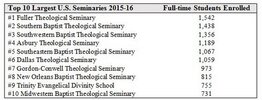DMcFadden
Puritanboard Commissioner
There is good news and there is bad news. Rank liberalism in its most pernicious forms has fallen out of favor among the watering holes for thirsty seminarians seeking to "drink deep" of the "Pierian spring" of theological knowledge.
The bad news is that confessional Reformational thinking is not valued nearly as much as broad evangelicalism, especially that coming with a flavor of egalitarianism and trendiness. I'm very sorry to see my alma mater top the list again. While it has been described as "arguably the most influential [seminary in America], by number of pastors and educators trained," it boasts of being "the voice of a third way" that is neither "right" nor "left." Nah . . . it is pretty much left.
. . . . . . [sigh]
. . . [sigh]
The evangelical Fuller Theological Seminary ranks largest with 1,542 full-time enrolled students during the 2015-16 academic year. Southern Baptist Theological Seminary and Southwestern Baptist Theological Seminary follow closely behind with 1,438 and 1,356 full-time enrolled students, respectively.
While all of the ten largest seminaries in the country are evangelical Protestant, it’s interesting that half of those schools are Southern Baptist-affiliated. Five of the six theological seminaries associated with the Southern Baptist Convention (SBC) are among the top ten largest in the country. Meanwhile, the SBC-affiliated Golden Gate Baptist Theological Seminary barely missed the list with 705 full-time students enrolled.
Fluctuations between America’s top ten largest seminaries during the 2015-16 and 1995-96 academic school years are surprisingly narrow. Only Reformed Theological Seminary, Presbyterian Church USA-affiliated Princeton Theological Seminary, and United Methodist Church-affiliated Candler School of Theology fell out of the top ten.
The bad news is that confessional Reformational thinking is not valued nearly as much as broad evangelicalism, especially that coming with a flavor of egalitarianism and trendiness. I'm very sorry to see my alma mater top the list again. While it has been described as "arguably the most influential [seminary in America], by number of pastors and educators trained," it boasts of being "the voice of a third way" that is neither "right" nor "left." Nah . . . it is pretty much left.
. . .
 . . . [sigh]
. . . [sigh]
